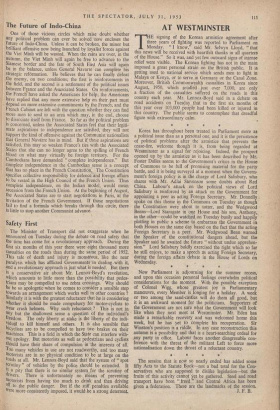T HE signing of the Korean armistice agreement after three years
of fighting was reported to Parliament on Monday. "I know,' said Mr. Selwyn Lloyd, "that this news will be received with heartfelt thanks in all quarters of the House." So it was, and yet few outward signs of intense relief were visible. The Korean fighting has not in the main imposed a great personal strain on the British public. It is getting used to national service which sends men to fight in Malaya or Kenya, or to serve in Germany or the Canal Zone. Moreover, British Commonwealth casualties in Korea since August, 1950, which totalled just over 7,000, are only a fraction of the casualties suffered on the roads in this country each year. Mr. Lennox-Boyd said in a debate on road accidents on Tuesday that in the first six months of this year over 103,000 people had been killed or injured in this country. The public seems to contemplate that dreadful figure with extraordinary calm.
* * Korea has throughout been treated in Parliament more as a political issue than as a personal one, and it is the persistence of political problems after the armistice that prevents the cease-fire, welcome though it is, from being regarded at Westminster as a signal for rejoicing. Indeed, the prospect opened up by the armistice as it has been described by Mr. Foster Dulles seems to the Government's critics in the House of Commons to be full of promising material for the party battle, and it is being surveyed at a moment when the Govern- ment's foreign policy is in the charge of Lord Salisbury, who shares with Mr. Adlai Stevenson some doubts about Red China. Labour's attack on the political views of Lord Salisbury is reinforced by an attack on the Government for appointing a peer as acting Foreign Secretary. Mr. Donnelly spoke on this theme in the Commons on Tuesday as though the Constitution were about to totter, and the Wedgwood Benns—Lord Stansgate in one House and his son, Anthony, in the other—could be watched on Tuesday busily and happily plotting in public a scheme to embarrass the Government in both Houses on the same day based on the fact that the acting Foreign Secretary is a peer. Mr. Wedgwood Benn warned the Speaker of the constitutional dangers ahead, but the Speaker said he awaited the future "without undue apprehen- sion." Lord Salisbury boldly exercised the right which so far he still enjoys, to make a speech as acting Foreign Secretary, during the foreign affairs debate in the House of Lords on Wednesday.
Now Parliament is adjourning for the summer recess, and upon this occasion personal feelings overwhelm political considerations for the moment. With the possible exception of Colonel Wigg, whose greatest joy is Parliamentary manceuvre, every Member is longing for a holiday. A week or two among the sand-castles will do them all good, but it is an awkward moment for the politicians. Supporters of the Government are not sure what the Government will look like when they next meet at Westminster. Mr. Eden bas made a remarkable recovery and was welcomed home this week, but he has yet to complete his recuperation. Sir Winston's position is a riddle. In any case reconstruction this autumn is a possibility and that is a heart-searching ordeal for Any party in office. Labour faces another disagreeable con- ference with the threat of the militant Left to force more nationalisation down the throat of a reluctant country.
The session that is now so nearly ended has added some fifty *Acts -to the Statute Book—not a bad total for the Con- servatives who are supposed to dislike legislation—but the fruits of this activity cannot yet be gathered. Steel and road transport have been " freed " and Central Africa has been given a federation. These are the landmarks of the session. J. F. B.


































 Previous page
Previous page